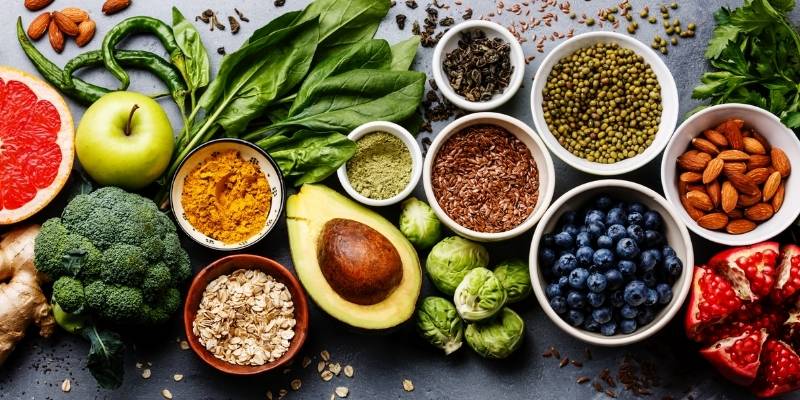Strong, plant-based molecules called phytonutrients surpass simple nourishment. Found in entire grains, legumes, fruits, and vegetables, they remarkably improve your health. Although not necessary for life, these natural compounds are powerful for general well-being and illness prevention.
Including more foods high in phytonutrients will help your immune system, guard your body against inflammation, and lower your risk of major diseases, including cancer and heart disease. This article will explore several phytonutrients, their main food sources, and their incredible health advantages.

Types of Phytonutrients
Different types of phytonutrients exist in foods, each with special health advantages. Knowing these groups will enable you to include many phytonutrients in your diet.
- Flavonoids: Flavonoids are among the most thoroughly investigated phytonutrients. They are the result of the vivid hues in fruits and vegetables. Common sources include berries, apples, onions, and dark chocolate. Flavonoids' antioxidant qualities aid the body in combating oxidative stress. Through better blood circulation, they could also help with heart health.
- Carotenoids: Pigments called carotenoids give fruits and vegetables their red, orange, and yellow colors. Foods high in beta-carotene, lutein, and zeaxanthin are found in carrots, sweet potatoes, and spinach. These drugs are well-known for impacting eye conditions and may reduce age-related macular degeneration risk.
- Glucosinolates: In cruciferous plants, including broccoli, kale, and Brussels sprouts, glucosinolates contain sulfur. Their capacity to detoxify toxins ties them to cancer prevention. Including these vegetables in your diet will improve your general well-being.
- Saponins: Saponins are found in legumes, entire grains, and a few vegetables. They might decrease cholesterol and have immune-boosting effects. Foods heavy in saponins include quinoa, lentils, and beans.
- Lignans: Lignans are phytonutrients Found in whole grains, some fruits, and seeds, especially flaxseeds. Their possible hormonal balancing action and antioxidant qualities are well-known. Including flaxseeds in your diet might offer a plentiful supply of lignans.
Food Sources of Phytonutrients
Many plant-based diets have lots of phytonutrients. Stressing a colorful diet full of many fruits, vegetables, grains, and legumes will help you maximize consumption. Typical causes include:
- Berries: Rich in folic acids and flavonoids, blueberries, strawberries, and raspberries
- Whole Grains: Supporting cardiovascular health are phenolic acids and lignans found in oats, brown rice, and barley.
- Cruciferous Vegetables: With glucosinolates, broccoli, kale, and cauliflower help to prevent cancer.
- Leafy Greens: High in carotenoids, spinach, kale, and Swiss chard foster eye health.
- Nuts and Seeds: Lignans and good fats abound from almonds, walnuts, and flaxseeds.
A well-balanced diet, including several of these items, guarantees that you gain many phytonutrients, which cooperate to improve general health and lower illness risk.

Health Benefits of Phytonutrients:
With protection against many diseases and health issues, phytonutrients have great overall health value. Among the major advantages are:
- Antioxidant Protection: Phytonutrients, particularly carotenoids and flavonoids, neutralize free radicals that can damage cells and hasten aging and diseases like cancer.
- Anti-inflammatory Effects: Powerful anti-inflammatory effects abound among phytonutrients. It is linked to heart disease and arthritis, and phenolic acids and flavonoids lower chronic inflammation.
- Cancer Prevention: Compounds such as glucosinolates and flavonoids can prevent cancer by boosting detoxification processes in the body and stopping tumor development.
- Heart Health: Lignans and flavonoids decrease cholesterol and blood pressure, improving cardiovascular health.
- Immune Support: Flavonoids and carotenoids boost the immune system, guarding against diseases and supporting general well-being.
Over time, including various phytonutrient-rich plant-based foods in your diet will help you noticeably improve your health.
Phytonutrients and Chronic Disease Prevention
Increasingly known for their ability to prevent chronic conditions including:
- Heart Disease: Phytonutrients protect blood vessels from oxidative stress, lower inflammation, and aid in sustaining appropriate cholesterol levels. These steps greatly reduce the risk of cardiovascular illnesses, including stroke and heart attack.
- Cancer: Several phytonutrients, including flavonoids in fruits and glucosinolates in vegetables, have been demonstrated to stop cancer cell development and improve the body's detoxification process.
- Diabetes: Several phytonutrients lower blood sugar levels and increase insulin, lowering the risk of type 2 diabetes.
- Obesity: Phytonutrients enhance metabolic health and lower inflammation, helping control weight and lower obesity-related issues.
It act as natural protectors. These substances lower the risk of chronic illness development and enhance quality of life. Long-term health maintenance depends on a diet heavy in phytonutrients.
Tips for Adding More Phytonutrients to Your Diet:
Using a few basic techniques will help you easily include more phytonutrients into your diet:
- Eat a Rainbow: At every dinner, try a range of vibrantly colored fruits and vegetables. The phytonutrients vary more the more hues they are.
- Nut and Seed Snack: Almonds and flaxseeds are excellent sources of lignans. They can be added to yogurt and cereals or consumed raw.
- Add Leafy Greens: Spinach, kale, and Swiss chard are easy to include in smoothies, salads, and side dishes.
- Choose whole grains: To boost your phenolic acid consumption, substitute nutritious grains, including oats, quinoa, and brown rice, for refined grains.
- Enjoy Cruciferous Vegetables: To help with glucosinolates, make regular meals with cauliflower, Brussels sprouts, and broccoli.
Little adjustments will help boost your phytonutrient intake and enhance your health effortlessly.
Tips for Maximizing Phytonutrient Absorption:
These guidelines can help you maximize the phytonutrients in your diet:
- Cook Smart: To retain their phytonutrients, gently simmer veggies, including broccoli and spinach. One can lower the levels of these important molecules by overcooking.
- Add Healthy Fats: Carotenoids are fat-soluble and found in vibrantly colored vegetables. Team them with healthy fats like olive oil or avocado to increase absorption.
- Fresh Is Best: Get fresh fruits and veggies wherever you can. Canned or too-processed meals may lose some phytonutrient content.
- Go organic: Because plants create these molecules to defend against pests and diseases, organic produce often boasts higher levels of several phytonutrients.
- Spice It Up: Phytonutrients abound among herbs and spices, including ginger, garlic, and turmeric. For even more health benefits, include them in your meals.
You may improve the health advantages of phytonutrient-rich foods by maximizing how you cook and eat them.
Conclusion:
Though not necessary for survival, phytonutrients are vital for long-term health promotion. Incorporating a range of fruits, whole grains, and seeds into your diet will help greatly lower your risk of chronic diseases and increase general well-being. From antioxidants to anti-inflammatory substances, these potent plant chemicals promote heart health, lower cancer risk, and boost immunity.













